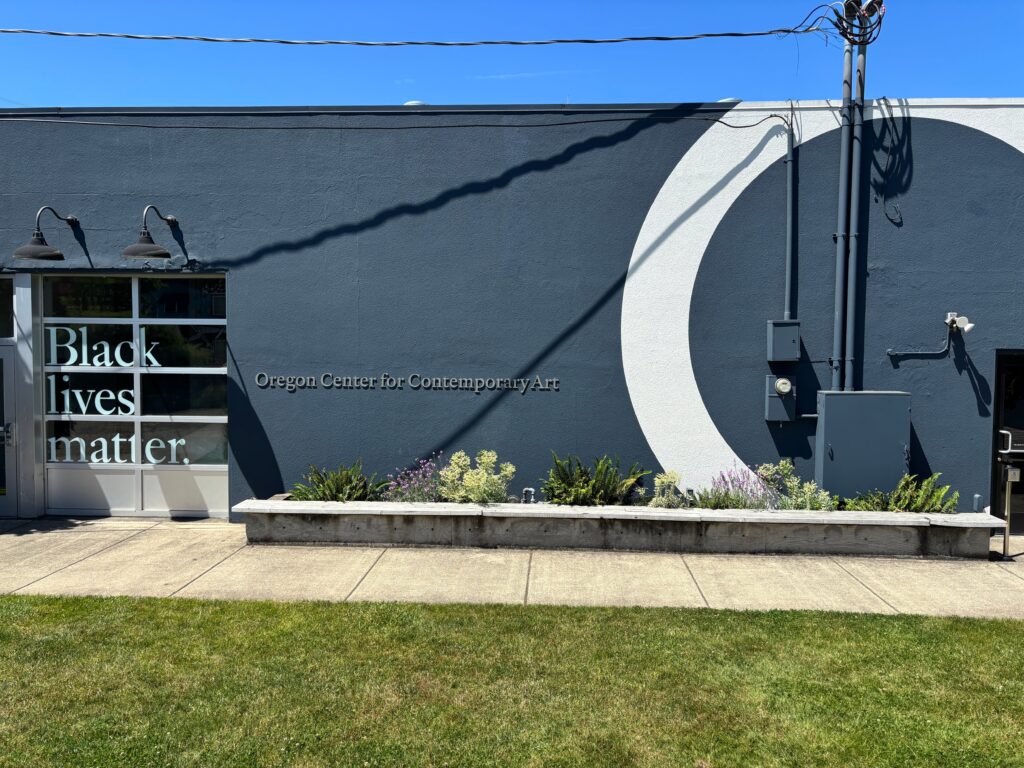Some Portland arts nonprofits are receiving less money from the city’s arts tax this year, which puts programs that make arts education more accessible to many Portlanders in peril as federal funding for the arts decreases and arts groups deal with rising expenses and decreased revenue.
The city altered its allocation of arts tax grant funds this year, giving larger awards to well-known downtown organizations while reducing the amount awarded to smaller organizations in other areas of the city. While some groups may receive more cash following this week’s partial repair, many will still receive less than in prior years.
The city also anticipates that each category will receive less next year.
In order to provide access to the arts throughout the city, Portland voters passed the arts tax in 2012. The majority of the approximately $12 million that is raised annually supports arts educators in the Portland region, with a smaller portion going toward collecting expenses and the arts education coordinator’s compensation.
According to the ballot measure, after funding one arts teacher for every 500 elementary school pupils in the region, more funds are allocated to grants to schools and non-profit organizations to give kindergarten through 12th graders access to high-quality arts programs and to make arts and culture experiences accessible to underprivileged communities.
These grants are funded by Portland’s general fund and arts tax revenue collected in the Arts Access Fund. The majority of the remaining arts tax revenue is allocated to what is known as General Operating Support for 80 local NGOs, with some grants of up to $5,000 going to smaller organizations.
The Regional Arts and Culture Council used to distribute the monies, but starting with the fiscal year 2024–2025, the city started allocating some awards through Portland’s Office of Arts and Culture after being accused of inefficiency and lack of openness in 2023.
(The city selected the Regional Arts and Culture Council and two other groups to disburse monies for its small grants program following a competitive process.)
Eighty groups received little over $4 million in General Operating Support grants for the fiscal year 2024-2025. Of that, about $800,000 came from the general fund, and the arts tax contributed $3.2 million.
In the past, the council had given out additional supplemental investment awards of up to $30,000 per nonprofit, unrestricted funds that were not based on budget size but rather on each organization’s capacity to demonstrate that it offered community advocacy, equity, or accessibility in the arts.
This fiscal year, the city eliminated that version of the investment award and substituted an arts access questionnaire for the multi-page application for the additional cash. The questionnaire asked groups to provide information about how many children and individuals from underserved communities they are serving.
Larger organizations received a larger incentive because the new bonus amount is based on each nonprofit’s budget.
Jeff Hawthorne, the Office of Arts and Culture’s grants program manager, said that not all of the organizations even applied for the additional funds because the previous application was too difficult. According to him, every organization involved in the program submitted a fresh application this year.
Through the revised application process, more than half of the 80 organizations that received municipal and arts tax-funded General Operating Support received less money in 2024–2025 than they did the year before.
The city gave some more funds this week to some of the organizations that had been impacted by the sudden termination of federal assistance and decreased city financing. Still, most of the nonprofits who received less funding than the previous year are.
With the top five organizations—Portland Center Stage, Oregon Symphony, Oregon Ballet Theatre, Portland Art Museum, and Portland Opera—receiving almost $600,000 more than the previous year and the bottom 75 organizations receiving more than $100,000 less, the gap between large and small organizations had already widened before the new funding was revealed.
According to the city, rent subsidies for Portland 5 Centers for the Arts facilities and a special allocation help to explain the large sums of money that went to the top five organizations.
According to Office of Arts and Culture spokesperson Kelly Knickerbocker, “those subsidies were moved into our portfolio as part of the General Operating Support program for efficiency and transparency so that we could issue those organizations one check, through one grant, managed through one contract, instead of having them continue to live as separate expenditures across other parts of the city.”
These subsidies, which are funded by Portland’s general fund rather than the arts tax, are scheduled to end at the end of this year. They were also significant additions, with the Oregon Symphony receiving $150,000 and the Oregon Ballet Theatre receiving about $70,000.
Additionally, under the direction of former Mayor Ted Wheeler, Portland Center Stage was given a special allotment of $250,000 from previously unspent arts tax monies.
Despite that disclaimer, the end result of the fiscal year 2024–2025 was that grants to a number of well-known downtown organizations increased in size, while funds to certain smaller organizations located elsewhere in the city decreased.
Arts organizations were devastated when they received less than they had anticipated.
The nonprofit community print studio, the Independent Publishing Resource Center, which also has a zine library and offers a range of printmaking classes, received $19,000 less than the year before.Ethos Music Center, which offers affordable music instruction, lost $11,000.A nonprofit organization in Portland called Friends of Noise, which educates youth about the music industry, lost sixteen thousand dollars.
The Oregon Contemporary Center for Art’s director, Blake Shell, sent out an email around the end of May with the subject, “Postponement of Our Summer Exhibition due to Funding Shortages.”
I regret to inform you that Ghosts in the Throat: Language, Song, Orality, and Resilience must be postponed. Shell written.
“Beyond the intent of the voted tax code and without citizen oversight, the Office of Arts and Culture of the City of Portland eliminated DEIA measurements from determining funding tiers of Arts Organization support last fall,” Shell said in her letter.
This year, Oregon Contemporary’s funding was initially $14,000 less.
According to Friends of Noise executive director Andr Middleton, the loss of any money is disastrous.
In North Portland, Friends of Noise is in the midst of establishing an all-ages music venue.
According to Middleton, every dollar lost represents a missed chance to provide our children with happiness, guidance, and education. The wider effects of the city’s reduced finances will make it more difficult for us to use the arts to support youth creative expression, mentorship opportunities, and the training of professionals in art creation.
To promote fair funding for the arts for all Portlanders, Shell and others founded the Portland Arts and Culture for Equity in reaction to the budget shift.
Some in the group believe that the emphasis has moved from the communities full of taxpayers who support the arts tax to downtown. Additionally, boosting the downtown economy is vital, but it is not the purpose of the artists tax.
According to Harper Quinn, director of the Independent Publishing Resource Center, meaningful access to the arts is having the ability to create art in addition to being able to view it. It’s also regrettable that the organizations most adversely affected by the shift in the allocation of arts funds are the tiny, community-forward locations in our communities that provide the greatest opportunity for artistic expression, education, and connection.
Some of the group’s claims are disputed by the Office of Arts and Culture.
According to them, there are several arts education programs run by large groups all across the city. Furthermore, the investment award was never given out as equity. Rather, it had to do with the more complex idea of access.
The increased funding, around $170,000, which comes from Portland’s general budget and was distributed to 25 organizations who receive General Operating Support, was announced by the Office of Arts and Culture on Wednesday.
Less than a week after Shell’s initial email, applications for that second prize were available, and they were due two weeks later.
The additional $8,000 Oregon Contemporary received was slightly more than half of what it had lost. “Oregon Contemporary is really appreciative that the city is listening to us about the impact of the loss of equity funding,” Shell stated on Wednesday.
However, she went on to say that the exhibition cannot be held this summer under this time limit. Rather, we are offering workshops, ticketed music performances, and a Portland Arts and Culture showcase for Equity organizations.
The Independent Publishing Resource Center, Friends of Noise, and Ethos did not receive any more funding.
Two groups released the same amount as the previous year, and four organizations—including Portland Playhouse and Write Around Portland—ended up with more than they did the year before.
Where the money went altered, in part. About half of the groups received more money than they did the previous year, and another half received less when the increased funds, rent subsidies, and allocation are taken into account.
However, everyone is probably going to get less next year.
They claim that this is because there is simply less money available. That $35 tax threshold hasn’t altered in more than ten years.
According to Chariti Montez, director of the Office of Arts and Culture, the arts tax revenue has remained constant at around $12 million. There is no doubt that inflation has changed. And then the cost to collect the tax has gone up because staffing costs go up and the amount that goes to school districts has gone up a lot.
Already, the amount of money from the general fund that will go towards the office is expected to be around $1 million less than this year, a total of $3.6 million.
According Montez, $300,000 additional funds have been added to the budget for next year for art activations in vacant spaces downtown, among other things. But even that may not be enough.
That s the money that we have to do everything that the Office of Arts and Culture is supposed to do, Montez said. Pay for our staff, do arts activations, add to grant making, manage the city s public art collection, cultural plan and the city s performing arts venues.
So, while the Office of Arts and Culture remains committed to the base awards for the 80 General Operating Support organizations, the city does not expect to give any additional money in subsidies, special allotments or investment awards next year.
Lizzy Acker writes the advice column and studies culture and life. Why, Tho?You can contact her at lacker@oregonian.com or 503-221-8052.





More Stories
A change to the way Portland arts tax grants are distributed left some smaller nonprofits with less money. The partial fix is only temporary
A change to the way Portland arts tax grants are distributed left some smaller nonprofits with less money. The partial fix is only temporary
A change to the way Portland arts tax grants are distributed left some smaller nonprofits with less money. The partial fix is only temporary